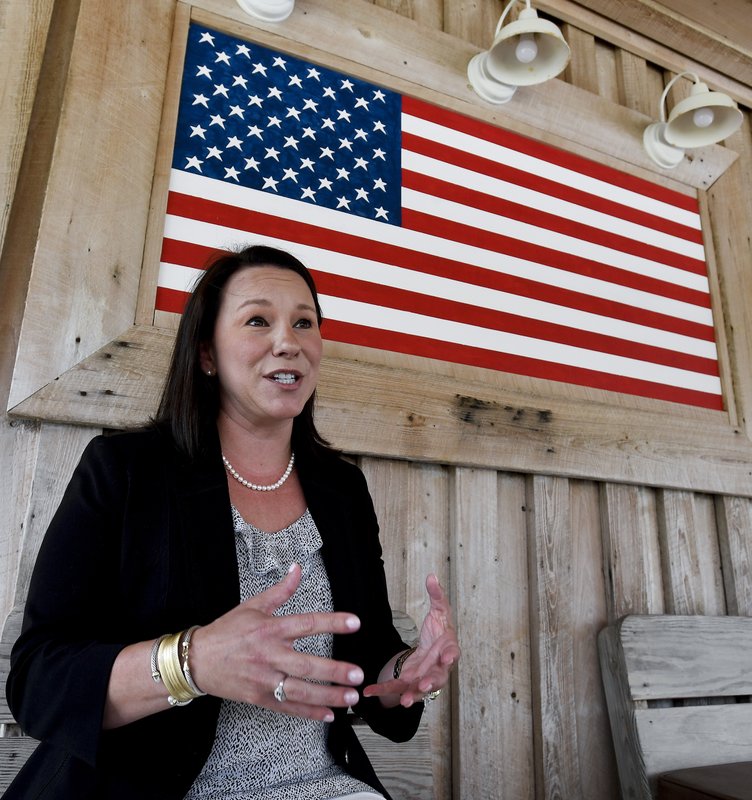Martha Roby: An update on progress for afghan women

Throughout my time in Congress, I have had the privilege to serve on several committees that directly influence our country’s defense and foreign policy initiatives, namely the House Armed Services Committee and the House Appropriations Committee. Most recently, this Congress, I was asked to serve on the State and Foreign Operations Appropriations Subcommittee. In this role, I have been part of many negotiations regarding funding levels for the many important programs we have overseas. Over the years, I have also used Congress’ constitutional oversight to question members of the Executive Branch about our country’s strategy abroad. I believe that this process is deeply important, and we must remain committed to upholding our country’s system of checks and balances when making critical military and foreign policy decisions. On top of my committee-specific duties related to foreign policy, for the past eight years, my colleague, Congresswoman Susan Davis, and I have led an all-female Mother’s Day trip to Afghanistan. During these trips, we have been given the opportunity to meet with our servicemen and women who are away from their families on Mother’s Day. I believe it is so incredibly important for members of Congress to see firsthand how our policy decisions impact the lives of Americans at home and abroad. I have been able to use what I’ve learned during these trips to make more informed decisions about military spending and defense policy. Also, importantly, these trips have afforded me the opportunity to reaffirm my commitment to improving circumstances for those in Afghanistan, especially Afghan women. While gains have undoubtedly been made since 2001, it remains critical that American leaders stay engaged to ensure continued forward momentum for these women. I recently addressed a group at the United States Institute of Peace, and I told them that it is my belief that a peace deal – a true, lasting peace in Afghanistan – will not be reached until all facets of the Afghan community have a seat at the negotiating table. This means Afghan society must continue to see an increased number of women serving in all societal roles – in the military, police force, as educators, and more. During this time when the future of Afghanistan is uncertain, these conversations I have participated in are so vitally important, and I have been honored to be a part of them. We have made great strides towards improving life for Afghan women over the years, but we must keep moving the ball down the field. The country simply cannot truly move forward until all its citizens have a bettered quality of life, and I will remain engaged in this fight. Martha Roby represents Alabama’s Second Congressional District. She lives in Montgomery, Alabama, with her husband Riley and their two children.
Martha Roby: Pro-life movement momentum is strong

As a member of the House Appropriations Committee, I have the privilege each year to advocate for the priorities most important to the people who live and work in Alabama’s Second District. Among many other key issues, I have been proud to stand up and fight for a strong military and smart agriculture policy on this committee. On the reverse, I am also in a strong position fight against funding from being steered towards programs or organizations that I adamantly oppose. Recently when the Appropriations Committee approved our Labor, Health and Human Services, Education, and Related Agencies (Labor-HHS) Fiscal Year 2019 funding bill, I had the opportunity to speak up for those who cannot speak for themselves: the unborn. As a member of the Labor-HHS Subcommittee, I am extremely proud to report that our bill passed by the full Committee includes the strong pro-life language I have fought for year after year and implements additional policy riders to defend life. Every single one of these measures is critically important and further ensures that no taxpayer dollars can be used for abortions. Among the key pro-life provisions included in the Labor-HHS FY19 funding bill are the Hyde Amendment, which directs that no taxpayer dollars be used to fund abortions, and the Dickey-Wicker Amendment, which bans Labor-HHS funding from being used on research that harms human embryos. In addition to these longstanding pro-life measures, our bill also includes several other important pro-life provisions that continue our efforts to assign greater protections for life under the law. These measures include the Conscience Science Protection Act, which protects the rights of health care providers that do not participate in abortion. In addition, the bill includes language that prohibits funding for fetal tissue research obtained from abortion. This measure might sound familiar because it is a direct response to the 2015 scandal that revealed how Planned Parenthood officials were systematically altering abortion procedures to preserve babies’ organs in order to sell them to researchers for profit. Planned Parenthood’s action was sick, callous, and completely inhuman. Finally, the bill includes language to prohibit abortion providers like Planned Parenthood from receiving any available funding, including through Title X family grants. This measure works hand-in-hand with the Trump Administration’s “Protect Life” rule, which also directs that Planned Parenthood is not eligible to receive Title X grant money. As I have said many, many times: Abortion is not family planning. Abortion is not health care. Organizations that offer these services should not receive taxpayer dollars that are intended for family planning. Throughout my time in Congress, I have remained unapologetically pro-life. I believe life begins at conception, and our laws and policies should reflect a strong commitment to defending life at every stage. I have considered it a great privilege to have a platform with which I can serve as a voice for the voiceless. After eight long years of coming up short pro-life victories, I am encouraged that we now have a President who supports our efforts and is willing to sign important measures into law. The pro-life movement’s momentum is strong, and I look forward to seeing it grow as we continue to impact meaningful change on behalf of the unborn. I am eager to support our Labor-HHS funding bill when it comes before the full House for a vote. ••• Martha Roby represents Alabama’s Second Congressional District. She lives in Montgomery, Alabama with her husband Riley and their two children.
Martha Roby: Highlighting productive discussions with military leaders

Serving on the House Appropriations Committee gives me a valuable and unique opportunity to participate in the conversations surrounding funding for the various functions of our federal government. It’s hard to believe it, but the debates on funding for the Fiscal Year 2019 have already begun. I’ve been glad to be part of these important discussions and advocate for programs that are critically important to the State of Alabama and our country as a whole. Recently the Defense Appropriations Subcommittee, on which I’m grateful to serve, held hearings to review the Fiscal Year 2019 budget requests from various services. So far during this budget request season, our subcommittee has heard from the Navy and the Marine Corps, the Air Force, and the Army. I was glad to take part in all these discussions for several reasons. I have always been a strong advocate for properly supporting our military so that our men and women in uniform have everything they need when we send them into harm’s way. Secondly, our state and district have a very large military presence, and I consider fighting for our interests one of my greatest responsibilities in Congress. When the Air Force testified before Defense Appropriations, I was glad to have the opportunity to have a conversation with Secretary of the Air Force Heather Wilson and Chief of Staff General David Goldfein. You may remember that Secretary Wilson was the key decision maker for the F-35 mission. We talked about the Air Force’s priorities for the next year, and I thanked her in person for making the decision to send the F-35 Joint Strike Fighter to the 187th Fighter Wing at Dannelly Field in Montgomery. As I told Secretary Wilson, the men and women of the 187th could not be more thrilled about this extraordinary opportunity, and our entire state and community share in this excitement. When the Navy and Marine Corps came before the subcommittee to discuss their budget request, I asked Chief of Naval Operations Admiral John Richardson about the F-35 mission’s potential to enable the Navy fleet as a whole to be more capable. I was thrilled when he assured me that yes, this would definitely be the case. In my role on the Appropriations Committee, I will also continue to support the Littoral Combat Ship (LCS) program manufactured in Mobile as well as the other important priorities for our state. During the Army’s testimony before Defense Appropriations, I reviewed the Army’s budget request with Secretary of the Army Dr. Mark Esper and Chief of Staff General Mark Milley. The people of Southeast Alabama care greatly about the Army, and we are so proud that our very own Fort Rucker is the home of Army Aviation. Unfortunately, the Fiscal Year 2019 budget request for Army Aviation aircraft is significantly reduced from this year, so I pressed Secretary Esper about this. I appreciated his response and his assurance that operations will proceed as usual at Fort Rucker. This news on top of the announcement we recently received that 17 Lakota helicopters will soon be added to the fleet at Fort Rucker are both great indications that this proud military installation in our backyard will continue to excel for years to come. Of course, in my role on the Appropriations Committee, I will continue push for strong Army Aviation funding. I deeply appreciate these distinguished military leaders for taking the time to review their budgets and priorities with us. Each of these individuals have led lives of dedicated service to our country, and I am grateful to their families for the many sacrifices made on our behalf. I will continue to prioritize the national security of this great nation, and as always, I will never stop advocating for the important work being done in Alabama’s Second District at Maxwell-Gunter Air Force Base and Fort Rucker. ••• Martha Roby represents Alabama’s Second Congressional District. She lives in Montgomery, Alabama with her husband Riley and their two children.
Democrat wins panel vote to debate new authorization for war

A GOP-controlled House committee unexpectedly agreed Thursday to a proposal by a strongly anti-war Democrat to force a debate on a new war authorization. The proposal would cut off the sweeping 2001 authorization to use military force against terrorism. The move by California Democrat Barbara Lee unexpectedly won voice vote approval by the House Appropriations Committee as it debated a Pentagon funding bill. Lee wants to force a debate on a new war authorization, and some Republicans agree that debate is a good idea. A surprised Lee took to Twitter to claim victory. “Whoa. My amdt to sunset 2001 AUMF was adopted,” Lee tweeted, using Washington code for authorization of military force. “GOP & Dems agree: a floor debate & vote on endless war is long overdue.” Lee’s amendment would repeal the 2001 law – which has been broadly interpreted to permit military operations beyond those contemplated at the time – 240 days after the bill is enacted, which Lee said in a statement “would allow plenty of time for Congress to finally live up to its constitutional obligation to debate and vote on any new AUMF.” The proposal has a long way to go before becoming law. For starters, it would likely be knocked out of the spending bill on procedural grounds during floor debate since spending bills technically aren’t supposed to carry policy language. The 2001 force authorization was enacted in the days after the Sept. 11 attacks to give the president greater powers to respond. It was very broadly drafted to authorize “all necessary and appropriate force against those nations, organizations, or persons he determines planned, authorized, committed, or aided the terrorist attacks that occurred on September 11, 2001.” A separate authorization for the war in Iraq was enacted just before the 2003 invasion. “It is far past time for Congress to do its job and for the speaker to allow a debate and vote on this vital national security issue,” Lee said. Republished with permission of The Associated Press.
Bradley Byrne urges continuation of nine mile state waters for red snapper

In December 2015, the federal government passed its annual omnibus spending bill, which included a provision to extend Alabama’s state waters from three nautical miles to nine nautical miles for 2016. The move aligned the state waters of Alabama, Mississippi and Louisiana with the state waters for Florida and Texas. On Tuesday, Alabama 1st District U.S. Congressman Bradley Byrne announced he recently sent a letter to the House Appropriations Committee urging the Committee to once again include a provision in the government funding bill to expand state waters in the Gulf of Mexico to nine miles for Red Snapper fishing. The language in the previous budget made the nine-mile extension valid through Fiscal year 2016, which ended September 30, 2016, requiring an extension to be valid in the 2017 fishing season. “As we prepare for the upcoming Red Snapper season, it is critically important that state waters remain out to nine miles,” explained Byrne. “Changing this provision just weeks before the season starts would create unnecessary uncertainty and confusion for our local fishermen.” Congressman Byrne continues to advocate for a long-term solution that gives more control over Red Snapper to the individual Gulf states instead of to the federal government. By giving states control over the data collection and stock assessments, Byrne believes we can get back to a full season again. He continued, “This solution alone is not enough to fix the larger Red Snapper issue, but continuing to have state waters out to nine miles is an important step in the right direction. I will continue working with my Gulf Coast colleagues to advance commonsense legislation that fixes this issue once and for all.” The full text of Byrne’s letter to the Appropriations Committee can be found below. Dear Chairman Culberson: As you and the Committee draft a funding bill for the remainder of Fiscal Year 2017, I urge you to include language from previous appropriations bills that extends the boundaries of state waters in the Gulf of Mexico to nine nautical miles for Red Snapper fishing. There continues to be serious concerns about the ability of the federal government to adequately manage the Red Snapper fishery in the Gulf. Efforts remain under way to find a long-term legislative solution to improve the way we gather data and information on the Red Snapper population and landings. These efforts also include a permanent extension of state waters out to nine nautical miles for Red Snapper fishing, which would bring parity to all the Gulf states. While these efforts continue, it is vitally important the Committee once again include a provision allowing for state waters to be extended. Without the inclusion of this provision, there would be great uncertainty among fishermen and access to the abundant Red Snapper fishery would be further reduced. Red Snapper fishing is about more than just the fishermen. The issue is of critical importance for the economies of coastal communities all along the Gulf Coast, including communities in my district. Ultimately, I urge the Committee to once again include this provision in any Appropriations bill as we continue working toward a permanent, long-term solution. I appreciate your attention to this critical issue.
Mo Brooks joins House colleagues in leading effort to defund sanctuary cities

In an effort led by Alabama 5th District U.S. Rep. Mo Brooks, Arizona 4th District U.S. Rep. Paul Gosar, Iowa 4th District U.S. Rep. Steve King and Colorado 4th District U.S. Rep. Ken Buck — a group of House Republicans are urging Congressional appropriators to defund “sanctuary cities” that prevent law enforcement officials from faithfully executing America’s immigration laws: In a letter sent Tuesday, the four sponsors and 35 additional co-sponsors submitted appropriations language requesting the House Appropriations Committee prevent funds from going to “sanctuary cities.” “Sanctuary cities” are municipalities that have limited their cooperation with federal officials regarding undocumented immigrants, in order to help illegal immigrants avoid deportation. Currently, there are around 340 sanctuary jurisdictions across the U.S. actively obstructing federal law enforcement protecting illegal immigrants in sanctuary cities, according to a recent study by the Center for Immigration Studies. The letter follows an executive order President Donald Trump issued on his fifth day in office, whereby allowing Attorney General Jeff Sessions and Homeland Security Secretary John Kelly to decide whether sanctuary cities would be eligible for federal grants. “Congress has an opportunity to work with the Trump Administration and enforce our nation’s immigration laws with respect to sanctuary cities,” said Congressman Mo Brooks. “Cities and localities who have refused to comply with federal immigration laws and knowingly shield dangerous felons from removal by ICE present a clear danger to our Republic. According to an ICE report from March of 2017, there are an estimated 300 cities and counties obstructing federal immigration agents from doing their jobs to deport dangerous criminals, thereby intentionally endangering Americans.” Rep. Gosar points to the U.S. Constitution as the reason he and his colleagues are taking action. “The concept of ‘sanctuary city’ policies is in direct opposition to the Rule of Law and our Constitution. Article 1, Section 8, Clause 4, gives Congress clear jurisdiction on immigration matters,” stated Gosar. “I’m pleased to see President Trump and Attorney General Sessions lead on this issue, but the House must also act by using the power of the purse. It’s long past time for Congress to crack down and defund sanctuary city policies that are proven to be deadly and put the security of our communities at risk.” The House has voted and passed language that prohibits federal funds from going to sanctuary cities five different times in recent years. “Sanctuary cities force the federal government to spend more money on immigration enforcement,” added Rep. Buck. “We must assert federal authority on federal issues and cut off funding for cities that violate the rule of law, which is what this appropriations request does.” The full text of the appropriations language request can be found HERE. The list of 35 House members who cosponsored this language request include Representatives Abraham, Arrington, Babin, Barletta, Brady, Brat, Mo Brooks, Buck, Cramer, DeSantis, Duncan, Farenthold, Franks, Gosar, Grothman, Hensarling, Hice, Hunter, Sam Johnson, Jones, Kelly, Steve King, Lamborn, Marino, McCaul, McClintock, Meadows, Olson, Ratcliffe, Rooney, Rouzer, Schweikert, Wagner, Webster and Yoho.
House keeps armed forces operating, approves $578 billion

The full U.S. House of Representatives on Wednesday overwhelmingly approved the fiscal year 2017 defense appropriations bill, with the support of the entire Alabama delegation, with a bipartisan 371-48 vote. In total, the bill includes $577.9 billion in funding, which is an increase of $5.2 billion over last year’s funding levels. “The bill closely reflects the Defense Appropriations bill the House passed last summer, and is consistent with the final National Defense Authorization Act for fiscal year 2017,” according to a statement from the House Appropriations Committee. “The legislation funds critical national security needs, including military operations and readiness programs, as well as health and quality-of-life programs for our troops and military families.” The bill has several big wins for the Yellowhammer State, including funding for three more Littoral Combat Ships (LCS), which are built in part by Austal USA, which employs over 4,000 people at their shipyard in Mobile. It contains $8.2 billion for the procurement of 74 F-35 Joint Strike Fighters, and the Montgomery-based 187th Fighter Wing is on the short list for being assigned this next-generation fighter jet. The bill also contains a strong budget for Army Aviation, including $187 million for 28 Lakota helicopters, which are the primary aircraft used for training at the Army Aviation Center of Excellence at Fort Rucker. Funding for key R&D priorities for the Redstone Arsenal in Huntsville have aso been increased Additional bill highlights include: Rejects the Obama Administration’s proposed troop level reductions that would cut as many as 36,000 servicemen and women from the Armed Forces; Fully funds a 2.1% pay raise for the military personnel; Provides for 1,305,900 active-duty troops and 813,200 Guard and Reserve troops; Provides funding for an additional 1,000 active duty Army soldiers, 1,000 Army National Guard soldiers, 1,000 Army Reserve soldiers, and 1,000 active duty Marines; Funds ongoing military operations against ISIS and other terrorist organizations; Provides funding for 13 Navy ships, 74 F-35 aircraft, 61 UH-60 Blackhawk helicopters, and other key military programs; Includes funding to address readiness shortfalls and much-needed maintenance; and Boosts funding for research and development of new military technology. Here’s what the Alabama delegation had to say about their votes: Alabama 1st District U.S. Rep. Bradley Byrne: Ensuring our military men and women have the funding and resources to do their job is a fundamental responsibility of Congress. By passing the Defense Appropriations Act today, the House is further reaffirming our strong, bipartisan commitment to supporting the U.S. military. Working with my House and Senate colleagues, I am proud we were able to secure funding for the construction of three more Littoral Combat Ships. These ships are a key component of the Navy’s fleet, and the additional funding is vital to the future of the Austal shipyard in Mobile. I call on the Senate to quickly pass this funding bill and send it to President Trump’s desk for his signature. Alabama 2nd District U.S. Rep. Martha Roby: I am proud to represent a district that is home to both Fort Rucker and Maxwell-Gunter Air Force Base. I’m pleased to report that this bill contains a strong budget for Army Aviation, including $187 million for 28 Lakota helicopters. It also contains an increase of almost $450 million for the Air Force’s cyber security efforts. This Appropriations bill also contains funding for the procurement of 74 F-35 Joint Strike Fighters. The Montgomery-based 187th Fighter Wing is on the short list for being assigned this next-generation fighter jet, and our Alabama congressional delegation is working together to make the case to the Air Force why this special unit is an ideal fit. Alabama 5th District U.S. Rep. Mo Brooks: Importantly, H.R.1301 includes a 2.1% pay raise for our service men and women, reverses the Obama Administration’s drawdown of troops, and increases funding for Israeli Cooperative Programs by $455 million. In total, $600.7 million is provided for the Israeli Cooperative Programs, including $332 million for equipment procurement and $269 million for research and development. An additional $43 million is included for Israeli anti-tunneling efforts. I’m very pleased key priorities for the Redstone Arsenal community have been increased – notably high energy laser research, cybersecurity research for a variety of Army platforms and integration of systems, and the Army’s important continued investment in Future Vertical Lift. Check back, this article will be updated as more statements are available.
Martha Roby: VA funding bill seeks progress on payments

This week the House Appropriations Committee marked up and approved the Military Construction and Veterans Affairs Appropriations Bill, advancing the annual legislation funding veterans services and military installations for consideration by the full House. While funding is the primary purpose, appropriations bills also offer an opportunity to effect needed policy changes. In this case, my colleagues and I on the Appropriations Committee sought to bring to light and repair some of the problems with the Department of Veterans Affairs‘ (VA) unwieldy Choice Program. With the VA reform and accountability law enacted in late 2014, Congress set up and funded the Choice Program to allow veterans who live far away from VA facilities or experience especially long waits to access health care from outside providers. However, implementation of Choice has been anything but smooth. I hear from veterans all the time who have tried to take advantage of this new option, only to face more delays, red tape and runaround. There are many reasons for the troubles with Choice, but funding should not be one of them. In fact, the $73.5 billion this appropriations bill directs toward the VA is the Department’s highest level of discretionary funding ever. Despite historic funding levels, the VA has had trouble following through on reimbursements to outside health providers. This problem has existed in Central Alabama for some time. As you may know, I am working to build a Veterans Community Health Network in Alabama in which community hospitals and other health providers will partner with the VA to deliver care for veterans in remote areas or those who need specialty care. I believe this hybrid system is the future of veterans care and can be a model for other areas. One of the primary hurdles we have faced is the complicated and tiresome reimbursement process. Hospitals, clinics and other health providers in Alabama want to be a part of the solution to improving veterans’ access to healthcare. However, they can’t be expected to do it for free. No veteran should be denied access to care because the VA hasn’t paid its bills. That’s why I worked to include language in the Committee Report calling attention to the problem and directing the VA to (1) comply with federal “prompt pay” requirements, and (2) account to Congress all the outstanding reimbursements owed to outside providers. My goal here is to prompt VA officials to settle outstanding debts and fix the reimbursement process so that providers can have full confidence in partnering with the VA. In Alabama, communication between the VA and local providers has definitely improved, which is a good first step. My office will continue to work through these issues on the local level so that our Veterans Community Health Network can be a success. As we do, I intend to use my influence in Congress to demand the VA pay its debts. • • • Martha Roby represents Alabama’s 2nd Congressional District. She lives in Montgomery, Alabama with her husband, Riley and their two children.


